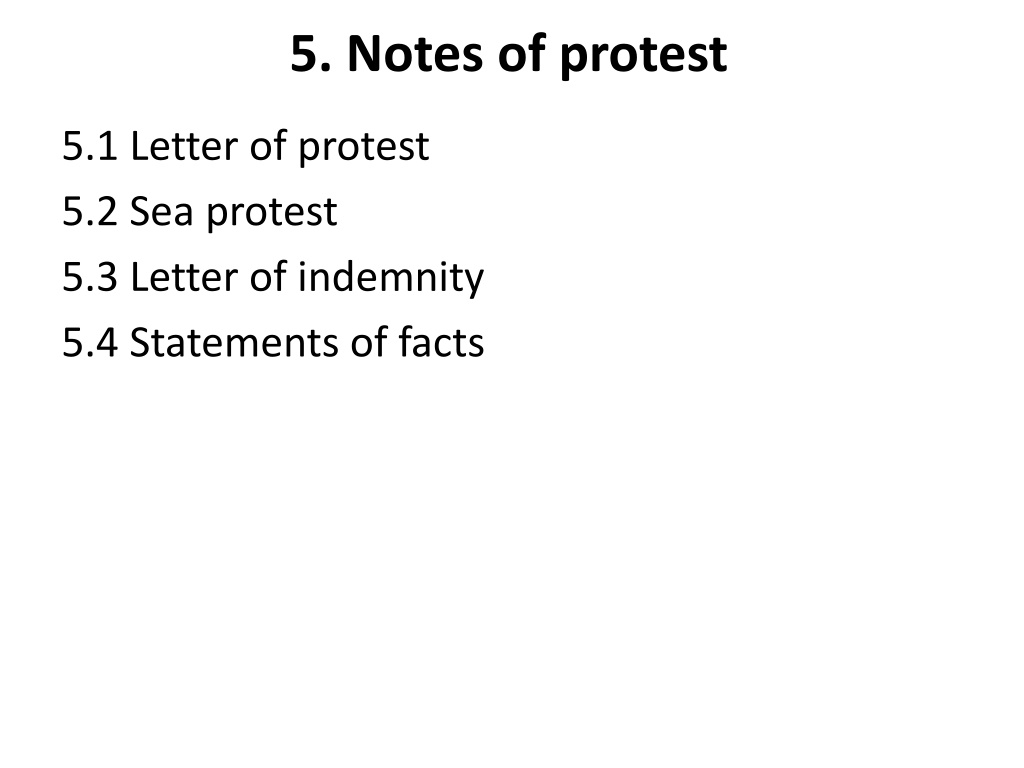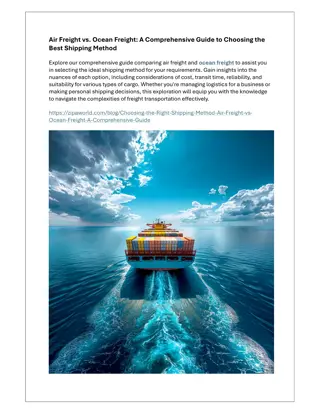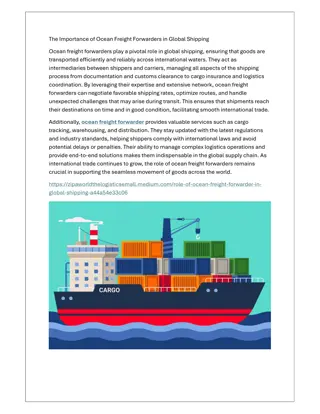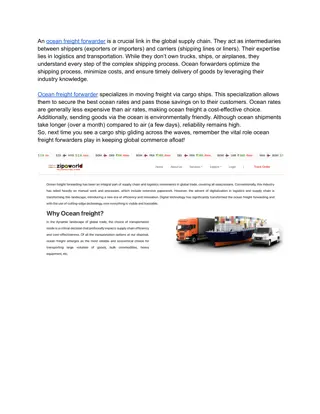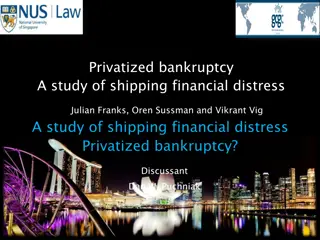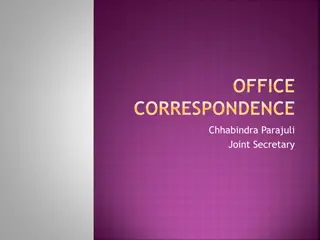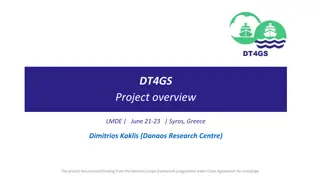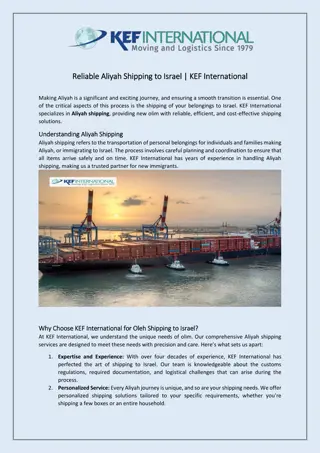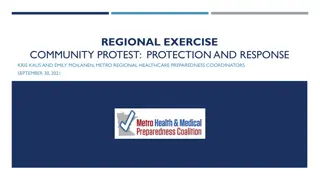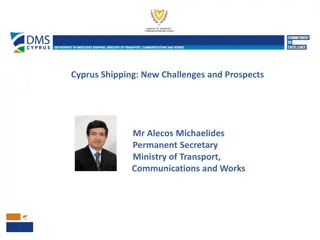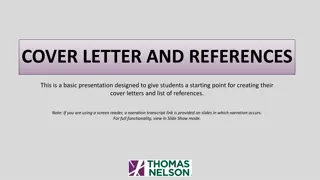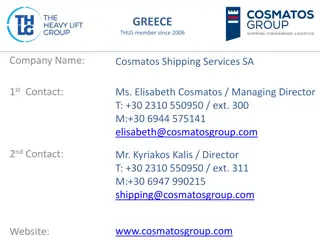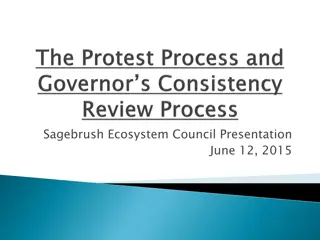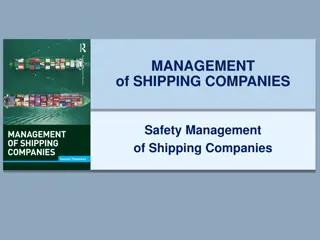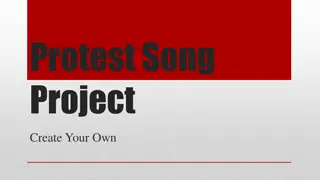Understanding Letters of Protest in Shipping
Letters of protest in shipping are formal declarations used to record discrepancies, delays, damages, or misconduct in maritime transactions. They serve as a legal recourse to address issues such as cargo shortages, loading delays, or disputes between parties involved in shipping contracts. Learn about when and why letters of protest are issued, their significance in documenting incidents, and their role in ensuring fair practices in the shipping industry.
Download Presentation

Please find below an Image/Link to download the presentation.
The content on the website is provided AS IS for your information and personal use only. It may not be sold, licensed, or shared on other websites without obtaining consent from the author. Download presentation by click this link. If you encounter any issues during the download, it is possible that the publisher has removed the file from their server.
E N D
Presentation Transcript
5. Notes of protest 5.1 Letter of protest 5.2 Sea protest 5.3 Letter of indemnity 5.4 Statements of facts
5.1 "Letters of Protest or "Notes of Protest" A letter of protest is a formal declaration whereby a person expresses a personal objection or disapproval of an act. It may be a written statement, made by a notary, at the request of a holder of a bill or a note that describes the bill or note and declares that on a certain day the instrument was presented for, and (e.g.) refused, payment.
In shipping there is a widespread practice of using letters of protest to record discrepancies between ship and shore figures, suspected presence of water content, damage to or loss of cargo, etc. Protests are also made by the master against the charterers of the ship or the consignees of the goods, for failing to load or unload the vessel pursuant to contract, or within reasonable or stipulated delays; On the other hand, the merchant may make a protest (i.e. Letter of Protest) against the master, for misconduct, drunkenness, etc., for not proceeding to sea with due dispatch, for not signing bills of lading in the customary form, and other irregularities.
WHEN IS A LETTER OF PROTEST ISSUED? Reasons for issuing a Letter of Protest : Delays/incidents during berthing/un berthing Delays at loading/discharge terminal (e.g. delays due to waiting for customs or immigration clearance ; waiting for pilot(s) , tug(s) ; waiting for orders to start loading /discharging ; waiting for another ship to finish, waiting for daylight ; other) Vessel overloaded/short loaded according to C/P (charter party) Difference between B/L and ship s figure (quantity) Bill of Lading does not contain C/P date ; named discharge port ; cargo quantity ; other. Slow loading at the request of the terminal
Letter of Protest for Cargo Shortage Letter of Protest for Cargo Shortage Dear Sirs, Please be informed that on receipt of the cargo documents presented, I note the following difference (s) between the ship s figures and the bill of lading figures: Ship s figure Bill of lading figure Cargo grade: Murban crude oil Cargo Grade: Murban crude oil Metric tons: 142,914.02Metric tons: 143,685.00Long tons:140,685.51Long tons: 141,417.00 Accordingly this letter of protest is lodged in lieu of endorsing the bill of lading with the ship s figures and the bill of lading must be taken only acknowledge the shipment of the weight or quantity given in the vessel s measurements on completion of loading and be issued without prejudice to the rights of the owners or
charterers to rely on the ships measurements aforesaid as evidence of the quantity actually shipped. I hereby give you notice that you will be held liable to indemnify the owners or charterers or both for any loss they may suffer by reason of your failure to notify the transferee and any subsequent holder of the bill of lading of the contents of this letter of protest. On behalf of the owners and charterers I further reserve the right to take such further actions as may be considered necessary to protect the interest of these parties. Yours faithfully, Master
5.2 Sea protest In maritime law, a sea protest is a notarized statement obtained after a ship enters port after a rough voyage. Its purpose is to protect the ship's charterer or owner from liability for damage to the cargo, the ship or to other ships in a collision, where this was caused by the perils of the sea (for example, bad weather). If it is known or suspected that such damage has occurred, the captain will make a sworn "protest in common form" at the office of a notary public, or a consul. If the full extent of any damage caused only becomes apparent while or after the cargo is unloaded, the captain may return to the office of the notary public to extend his protest. If a sea protest is not made, the owner or charterer may be liable for the damage caused and may be unable to produce the ship's log (which would have recorded the relevant incidents) as evidence in court.
In any of the circumstance enumerated below it is advisable for the master to note a protest. 1. Whenever during the voyage the ship has encountered conditions of wind and sea which may result in damage to cargo. 2. When from any cause the ship is damaged, or there is reason to fear that damage may be sustained. 3. When through stress of weather it has not been practicable to adopt normal precautions in the matter of ventilation of perishable cargo. 4. When cargo is shipped in such condition that it is likely to suffer deterioration during the voyage. In this case, however, the protest will not be effective unless the bills of lading were endorsed to show the condition of the cargo at the time of shipment. 5. When any serious breach of C/P terms is committed by the charterer or his agent, such as refusal to load, unduly delaying loading, loading improper cargo, refusal to pay demurrage, refusal to accept B's/L in the form signed by the master, etc. 6. When consignees fail to discharge cargo or take delivery thereof, and pay freight in accordance with C/P orB/L terms. 7. In all cases of general average
Protest should be noted as soon as possible, certainly within 24 hours of arrival in port. and in the case of cargo protests before breaking bulk. A note of Protest is simply a declaration by the master of circumstances beyond his control which may give, or may have given, rise to loss or damage. Such declaration must be made before a notary public, magistrate, a consular officer, or other authority. Usually, statements under oath will be taken from the master and other members of the crew and these statements will have to be supported by appropriate log book entries. At the time of noting protest the master should reserve the right to extend it.
Protests are admissible in evidence before legal tribunals and, in many cases, are essential to the establishment of a claim. (a) In many countries, particularly on the Continent protests are received in evidence as a matter of course. (b) In the United Kingdom, however, they are not accepted as evidence in favour of the party making the protest unless both parties consent. The chief use of a protest in the United Kingdom is to support a claim by a cargo owner against his underwriters. There is no legal necessity for a protest in the United Kingdom and legal rights are in no way affected if a protest has not been noted.
5.3 Letter of indemnity A written undertaking by a third party (such as a bank or insurance company), on behalf of one of the parties (the first party) to a transaction or contract, to cover the other party (the second party) against specific loss or damage arising out the action (or a failure to act) of the first party. Also called indemnity bond, bond of indemnity. 1. A letter guaranteeing that contractual provisions will be met, otherwise financial reparations will be made. 2. A letter requesting replacements for lost shares from a company's treasury.
5.4 Statements of facts Statements of fact can be verified, or checked, for accuracy. often include dates, numbers, and statistics. do not vary from person to person or place to place. describe events in language that has little or no emotional effect on the listener or reader. don t make predictions, express value judgments, or offer interpretations. aren t subject to change, except in cases where previously unavailable information or new technology arrives on the scene.
A document usually prepared by the agent which lists the significant times and events during a vessel's port call. This document is signed by the preparer, the vessel master, and the terminal's, or shipper's, or receiver's, representative. The times on a Statement of Fact are then used to calculate the laytime usually using a calculation sheet called a laytime statement.
The Statement of Facts is a document which can be central to many disputes between Owners and Charterers (and others) as this is the document where relevant facts are recorded and the sequence of events can be followed. At the same time, the statement of facts is not the only truth and will in some cases only be signed by one or more parties for receipt only to indicate that either the whole, or at least part, of the statement is not necessarily agreed to. If a dispute continues to litigation, the facts of what transpired at a given time may, however, be difficult to establish and it would certainly be costly to obtain either witness statements or even direct evidence by hearing relevant witnesses sometimes a very long time after the event.
It is therefore important to be aware of the way the courts and arbitration panels view a statement of facts. It is certainly not the case that a statement of facts is treated as being in any way absolutely final , but case law both before the ordinary courts and before arbitration panels has shown that the Statement of Facts is indeed treated as a very important piece of evidence.
Facts and Opinions A fact is a specific detail that can be proven as true based on objective evidence. An opinion is a feeling, judgment, belief, or conclusion that cannot be proven true by objective evidence. Objective proof can be one or more of the following: physical evidence, an eyewitness account, or the result of an accepted scientific method.
Separating Fact from Opinion Know the traits of facts and opinions. Fact: Spinach is a source of iron. Opinion: Spinach tastes awful.
Facts and Opinions Opinion Fact Objective States reality Can be verified Presented with unbiased words Subjective Interprets reality Can NOT be verified Presented with value words Spinach is a form of iron. Spinach tastes awful.
